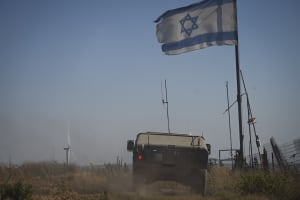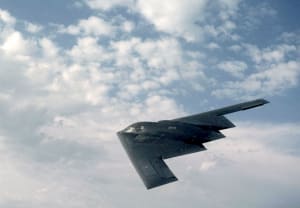Will Syria become the next war front? Israel reportedly builds defensive structure in violation of ceasefire agreements
IDF Chief Halevi: ‘We are striking a lot in Syria and Syria-Lebanon border’

Once among Israel’s most sensitive borders, the frontier with Syria has taken a backseat to the active fighting in Gaza and Lebanon, as well as the intense counter-terror operations in Judea and Samaria.
With additional threats from Yemen and Iraq and the recent worrying trends along the Jordanian border, the roughly 80 kilometers (50 miles) of border along the Israeli Golan Heights have flown well under the radar during the current war.
However, several worrying signs have begun popping up on the Israeli security establishment’s radar, possibly causing the new construction of a large defensive structure along the so-called Alpha Line, in breach of the ceasefire agreements with Syria, according to recent media reports.
#Syria: HD imagery showing the defensive system Israel is building since the summer between the Golan border fence and the Alpha line W. of Quneitra province.
— Qalaat Al Mudiq (@QalaatAlMudiq) November 11, 2024
Source: https://t.co/R4LrhAVSlj pic.twitter.com/uZW2deWWJ1
In the first months of the war, several rockets were fired at Israel from Syria, but incomparably much smaller numbers than from Gaza, Lebanon and Iran.
Since then, the Syrian border has mainly been the theatre of action where Israel shoots down numerous drones launched by Iraqi militias, however, the Syrian regime’s armed forces, as well as Hezbollah’s Syrian branch, called the “Golan File,” have largely refrained from provocations.
On the other hand, Israel has rapidly increased the pace and scope of its actions against Iranian networks in Syria, which began long before the current war, and has carried out numerous strikes against Hezbollah, its Syrian allies and even directly against IRGC forces.
In recent weeks, Israel even carried out highly unusual commando raids on Syrian ground, one of which the IDF even publicized. This week, the IDF reportedly eliminated Hezbollah’s Golan File commander, Ali Musa Daqduq.
“From [Hassan] Nasrallah, Hezbollah’s Jihad Council, the commanders of the various units and areas… and a great many operatives… we have taken away a lot of capabilities,” IDF Chief of Staff Lt.-Gen. Herzi Halevi said this week.
“The IDF is working very hard, striking heavily in Beirut, Hezbollah targets. We are striking deep [in Lebanon] and we are striking a lot in Syria and on the Syria-Lebanon border, so that weapons do not reach Hezbollah,” he added, again openly acknowledging Israeli strikes in Syria – a clear change in policy for Israel, which has traditionally not commented on its actions in Syria.
One of the main factors complicating Israel’s freedom of action in the country and discouraging it from publicizing its actions is the large presence of Russian armed forces, which rescued the regime from defeat in the civil war and have since been its main guarantor of stability, alongside the Iranian regime.
Israel has long coordinated its strikes against Iranian elements with Russia, to prevent accidentally harming its forces. This almost happened several times in recent months.
Another worrying sign on the Golan Heights has been the increased presence of Russian troops near the border, both on the ground and in aerial patrols.
Despite Israel's concerns, it has been reported that the Israeli Air Force (IAF) destroyed several radar stations of the Syrian army in recent months, both before and after its large-scale airstrikes in Iran, possibly indicating Russian acquiescence or Israeli confidence that Syrian and Russian air defenses no longer pose a threat.
Since this summer, Israel is quietly building a defensive system along the Alpha line bordering Golan, sat imagery reveals.
— Qalaat Al Mudiq (@QalaatAlMudiq) October 21, 2024
It starts 3.3 km from Assad-held town of Hader in #Quneitra province (#Syria) & already extends over a distance of 7+ km.
📸: October vs July https://t.co/QJ3Ou6V4Sj pic.twitter.com/Efu9ebBnYg
On the ground, Israeli observations of Syrian violations of the May 1974 Disengagement Agreement –governing border relations under the oversight of the UN's peacekeeping Disengagement Observer Force (UNDOF) – prompted Israel to submit a 71-page letter of complaints to the United Nations in June."
The letter identified “Syrian violations of the Alpha Line and armed presence in the area of separation (that) occur daily,” however, it was unclear whether Syrian, Iranian or Russian forces violated the border agreement.
According to UNDOF, the following month, Israel began constructing a large-scale defensive structure – which both Israel and Syria haven’t officially acknowledged yet – along the so-called Alpha Line.
Israel and Syria are separated by a 235 km2 UNDOF buffer zone, whose western border is the “Alpha” line, while the eastern border is the “Bravo” line. The buffer zone lies within Syrian territory and is populated by Syrian civilians.
UNDOF accused Israel of committing “severe violations” of the ceasefire agreement through the new construction, alleging that troops and construction vehicles crossed the Alpha Line into the demilitarized zone in Syria.
“Violations of the 1974 Disengagement Agreement have occurred where engineering works have encroached into the AOS [area of separation],” the peacekeepers stated. “There have been several violations by (Israel) in the form of their presence in the AOS because of these activities.”
“Based on the engagement, (Israel) has indicated that the current earthworks are being carried out for defensive purposes to prevent unauthorized crossing and violations by civilians,” UNDOF added.
According to new, high-resolution satellite footage published by the Associated Press this week, the structure now includes earthen ramparts, possibly meant as a temporary defensive measure, as well as an asphalt road along the border and new fences.
The new defensive structure indicates Israel is taking precautionary measures to prevent the Syrian border from turning “hot,” while also drawing on lessons learned from the Oct. 7 invasion by creating buffer zones along its border to provide greater forewarning against a potential ground incursion.
Many Israeli politicians have called on the IDF to implement this strategy in southern Lebanon after it was used in Gaza and now, possibly, on the Golan Heights as well.

Hanan Lischinsky has a Master’s degree in Middle East & Israel studies from Heidelberg University in Germany, where he spent part of his childhood and youth. He finished High School in Jerusalem and served in the IDF’s Intelligence Corps. Hanan and his wife live near Jerusalem, and he joined ALL ISRAEL NEWS in August 2023.














